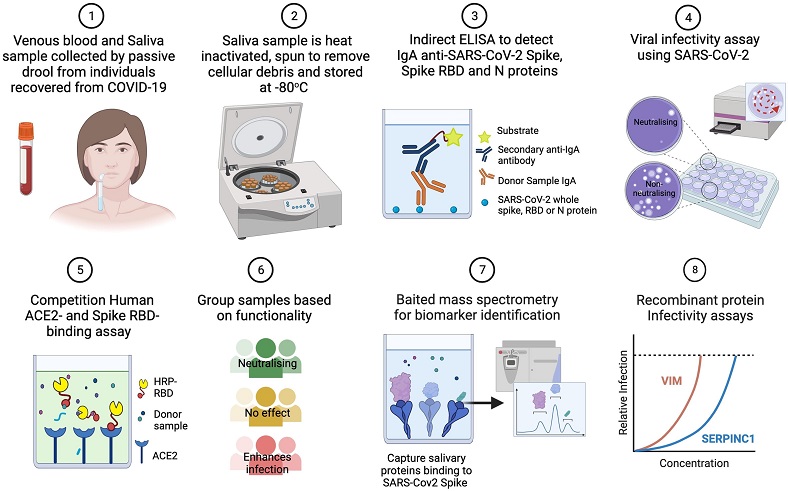COVID-19 News: UK Study Finds That Salivary IgA and Vimentin Determines Degree Of SARS-CoV-2 Infectivity!
Nikhil Prasad Fact checked by:Thailand Medical News Team Nov 25, 2023 2 years, 2 months, 4 weeks, 1 day, 58 minutes ago
COVID-19 News: The global fight against COVID-19 has prompted intense research efforts to uncover novel insights into the SARS-CoV-2 virus. A study conducted by researchers at University College London and Great Ormond Street Hospital NHS Foundation Trust in the UK that is covered in this
COVID-19 News report, delves into the intricate world of salivary immunological factors and proteins to determine their role in protecting against SARS-CoV-2 infection. The study findings shed light on the significance of salivary IgA and vimentin in influencing the degree of infectivity in convalescent COVID-19 patients.
 Schematic of methods used to study mucosal correlates of protection against in vitro SARS-CoV-2 infection in saliva.
The Initial Battlefront: Mucosal Sites
Schematic of methods used to study mucosal correlates of protection against in vitro SARS-CoV-2 infection in saliva.
The Initial Battlefront: Mucosal Sites
SARS-CoV-2, the virus responsible for COVID-19, first targets the epithelial cells lining the mucosal surfaces of the nasal passages, nasopharynx, and oral cavity. These mucosal sites serve as the primary battleground where the virus binds to the ACE2 receptor via its spike protein, initiating infection. Recognizing the critical role of mucosal immunity in minimizing viral transmission and infection, the researchers embarked on a mission to identify proteins in saliva that could potentially protect against SARS-CoV-2 infection.
Purpose of the Study
The overarching goal of this research was to pinpoint salivary immunological factors and proteins that act as guardians against SARS-CoV-2 infection. By understanding these protective mechanisms, the study aimed to contribute to the development of innovative strategies for preventing and treating COVID-19.
Saliva as a Gateway for Investigation
Saliva, with its high accessibility and non-invasive collection process, emerged as the perfect gateway for screening in this study. The researchers collected 551 saliva samples from 290 healthcare workers who had tested positive for COVID-19 between June and December 2020, prior to vaccination. Leveraging in vitro assays, mass spectrometry, and ELISA experiments, the team meticulously categorized the samples based on their ability to block or enhance infection.
Salivary IgA - A Key Player
The study found that IgA specific to SARS-CoV-2 antigens was detectable in over 83% of the convalescent saliva samples. Notably, concentrations of anti-RBD IgA exceeding 500 pg/µg total protein correlated with reduced viral infectivity in vitro. However, a significant dissociation between the salivary IgA response and systemic IgG titers in convalescent COVID-19 patients raised intriguing questions.
Unveiling Novel Proteins: Vimentin
Employing an innovative technique called spike-baited mass spectrometry, the researchers identified novel spike-binding proteins in saliva. Among these proteins, vimentin emerged as a standout player, showing a correlation with increased viral infectivity in vitro. Vimentin, traditionally known as an intracellular cytoskeletal protein, was found to be pre
sent in extracellular secreted and cell surface forms in saliva.
Decoding the Results
The study's results revealed that saliva, when pre-incubated with SARS-CoV-2, significantly reduced the amount of cell death caused by the virus. Interestingly, while most saliva samples had a minimal impact on infectivity, a subset exhibited a remarkable reduction or increase in infectivity. The concentration of anti-RBD IgA proved to be a significant factor, with samples exceeding 500 pg/µg total protein demonstrating a substantial reduction in viral infection.
Persistence and Demographics
Analyzing samples provided at intervals of 3-5 weeks, the researchers observed the persistence of anti-S and anti-RBD IgA over time, while anti-N IgA levels declined. Demographic factors such as age and ethnicity also played a role, with older individuals and certain ethnic groups exhibiting variations in IgA responses.
Vimentin: The Culprit or Co-Receptor?
Mass spectrometry and proteomic analysis pinpointed vimentin as the most discriminatory protein associated with enhanced in vitro SARS-CoV-2 infection. Further experiments validated that recombinant vimentin alone could increase viral infectivity. Intriguingly, vimentin and the SARS-CoV-2 spike protein co-localized in infected primary human differentiated nasal epithelial cells, suggesting a possible interaction.
Implications and Future Directions
This groundbreaking study not only highlights the crucial role of salivary IgA in mitigating SARS-CoV-2 infectivity but also introduces vimentin as a potential therapeutic target for COVID-19. The findings pave the way for future research aimed at unraveling the intricate mechanisms by which vimentin influences viral entry, replication, and overall infectivity.
Conclusion
In the ongoing battle against the COVID-19 pandemic, understanding the nuances of the immune response and identifying key players such as salivary IgA and vimentin is paramount. This study not only expands our knowledge of mucosal immunity but also opens new avenues for the development of targeted strategies to combat SARS-CoV-2. As research continues to unveil the mysteries of the virus, the collaboration between academia and healthcare institutions remains crucial for advancing our collective understanding and finding effective solutions to the ongoing global health crisis.
The study findings were published in the peer reviewed journal: Mucosal Immunology.
https://www.sciencedirect.com/science/article/pii/S1933021923000909
For the latest
COVID-19 News, keep on logging to Thailand Medical News
